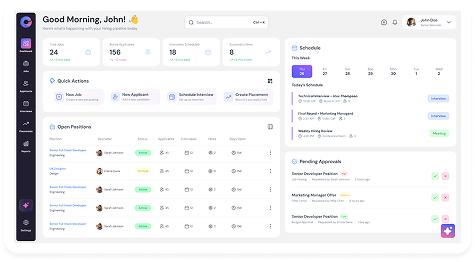Building Lasting Relationships: The Power of Candidate Relationship Management
In today’s competitive talent market, attracting and retaining top performers requires more than just an effective recruitment process. Candidate Relationship Management (CRM) empowers organizations to cultivate strong relationships with candidates, fostering a positive employer brand and building a robust talent pipeline.
Beyond the Application
CRM goes beyond simply managing applications. It’s a strategic approach that focuses on nurturing relationships with candidates throughout their interactions with your company, from initial touchpoints to potential future opportunities.
Benefits of a CRM Strategy
- Enhanced Candidate Experience: CRM fosters a positive experience by ensuring clear communication, timely updates, and personalized interactions throughout the recruitment process. This builds trust and goodwill with candidates, even if they aren’t ultimately selected.
- A Talent Pool for the Future: By staying connected with qualified candidates who weren’t the right fit for a specific role, you create a valuable talent pool for future openings. These individuals are already familiar with your company culture and values, making them prime candidates for subsequent hiring needs.
- Improved Employer Branding: A positive candidate experience translates into a stronger employer brand. Candidates who feel valued throughout the process are more likely to recommend your company to others, expanding your reach and attracting a wider pool of talent.
- Streamlined Recruitment: CRM tools can automate many communication tasks, freeing up HR teams to focus on strategic initiatives and building relationships with candidates.
Key Features of a CRM System
Modern CRM systems offer a variety of features to streamline candidate relationship management:
- Centralized Candidate Database: Store and manage all candidate information in one secure and accessible location. This allows you to easily track interactions and tailor communication based on individual profiles.
- Automated Workflows: Automate repetitive tasks like sending personalized emails, scheduling interviews, and gathering feedback. This saves time and ensures consistency in communication.
- Engagement Tools: CRM platforms may include engagement tools such as targeted email campaigns, social media outreach, and personalized content to nurture relationships with candidates.
- Reporting and Analytics: Gain valuable insights into candidate interactions and the effectiveness of your CRM strategy. Analyze data to identify areas for improvement and optimize your outreach efforts.
Building a Winning CRM Strategy
Here are some key considerations for building a successful CRM strategy:
- Segmentation is Key: Segment your candidate pool based on skills, experience, and career interests. This allows for targeted communication and engagement efforts.
- Content is King: Provide valuable content to candidates through blog posts, industry news, or career advice. This positions your company as a thought leader and keeps you top-of-mind.
- Regular Communication: Stay connected with candidates through regular communication, even if they haven’t applied for a specific role. Share company updates, success stories, or upcoming events to nurture relationships.
- Invest in Training: Train your recruitment team on CRM best practices to ensure consistent and effective communication with candidates.
The Future of Candidate Relationship Management
As technology evolves, we can expect CRM to become even more sophisticated. Here are some potential future trends:
- AI-Powered Personalization: AI could personalize candidate journeys by tailoring communication and content based on individual profiles and interests.
- Social Listening: CRM systems may leverage social listening tools to identify high-potential candidates and proactively reach out to them before they even apply.
- Predictive Analytics: Advanced analytics could predict which candidates are most likely to be receptive to future opportunities, allowing for strategic engagement.
By implementing a robust CRM strategy, organizations can build lasting relationships with top talent, create a talent pool for future needs, and ultimately gain a significant edge in the competitive recruitment landscape.

